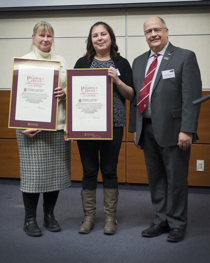 Landscape of Culture
Landscape of Culture
The President’s Award for Public Engagement Partnerships goes to the Double Mer Point Archaeological Project
January 2017
Dr. Lisa Rankin of Memorial University’s Archaeology Department and Rigolet AngajukKâk, Jack Shiwak, received the university’s President’s Award for Public Engagement Partnerships December 16, 2016. The award was for the Inuit community-led archeological dig at Double Mer Point, just a few kilometres outside of Rigolet.
“It was lovely to have Memorial University recognize the partnership between the Town of Rigolet and the archaeologists and students in the Department of Archaeology at Memorial University. This award celebrates research that was initiated by the community to meet community goals. Often it is outside researchers that set the agenda for research. In this case the archaeologists were able to bring their skills to support the community. At the same time, the research at Double Mer Point was a real partnership. As an academic I was allowed to train my undergraduate and graduate students through site excavations and also use the data recovered to answer questions about Inuit history in the region. We were able to make the project work for everyone involved.”
Rankin has been doing her archaeological work near Rigolet as part of the Tradition & Transition Research Partnership, which is made possible with funding from the Social Science and Humanities Research Council of Canada. In 2013 the Rigolet Inuit Community Government approached Dr. Rankin who was wrapping up an archaeological project on the South Coast of Labrador to see if there would be any interest in developing the archaeological site just outside the community at Double Mer Point. A partnership was formed which would see Dr. Rankin and her students coming to Rigolet each summer to excavate three traditional Inuit sod winter homes.
Even though the archaeological dig is not supposed to finish up until this summer, the site has already become a hot spot for curious tourists and locals alike. As community members come to look at what the archaeological team has found, they help to identify objects the team has unearthed. Rankin and her team always make a point of hiring local summer students as well.
“It’s really nice to be working with a community on a project that is relevant to them. Small hamlets like Rigolet don’t always have the skills in their own communities that allow them to complete projects like this one on their own. The partnership involved training for Rigolet youth that helps with that. It also allowed me to bring students from St. John’s and elsewhere to work on the site” says Rankin. “The students I brought from Memorial University learned a lot about Inuit culture and life in a northern Inuit town. My hope is that this kind of experience sets the stage for future collaborations as these students begin careers of their own.”
Rigolet has just finished construction of North America’s longest wooden boardwalk with the community on one end and the archaeological site on the other. The community of just over 300 people beat out the metropolis of Atlantic City, NJ which was the previous record holder. Their goal was to develop the Double Mer Point site as a destination at the end of the boardwalk for tourists passing through in the summers.
“With the development of the Mealy Mountains National Park and with the increasing amount of cruise ship traffic going up the Labrador coast, Rigolet has seen an opportunity to develop Inuit-based cultural tourism,” explains Rankin. “The boardwalk and the Double Mer Points site are perfect destinations for day-trippers. And at the end of their visit these tourists will leave knowing much more about the community.”
To learn more about the Double Mer Point Archaeological Project, check out the APTN Series Wild Archaeology which features two episodes on the dig site.





